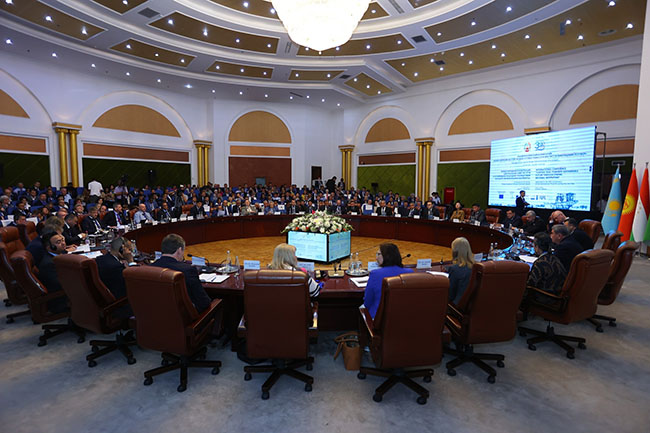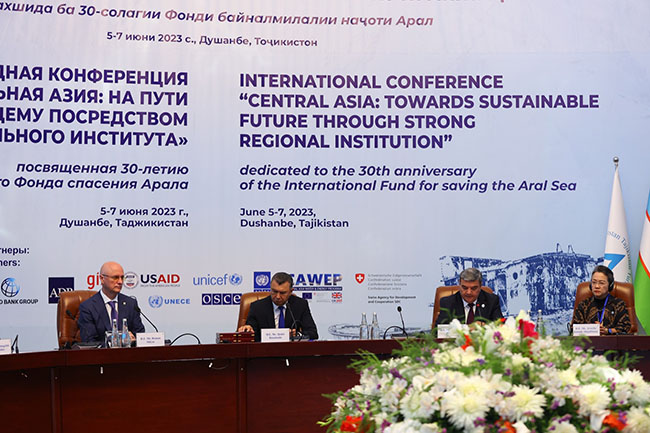SIC ICWC PARTICIPATES IN THE IFAS JUBILEE CONFERENCE
The International Conference “Central Asia: towards sustainable future through strong regional institution” dedicated to the 30th anniversary of the International Fund for saving the Aral Sea was started on the 6th of June 2023.

H.E. Mr. Q. Rasulzoda, Prime Minister of the Republic of Tajikistan, H.E. Mr. R. Sklyar, First Deputy Prime Minister of the Republic of Kazakhstan, H.E. Mr. Sh. Ganiev, Advisor to the President of the Republic of Uzbekistan, H.E. Mr. A. Yazmyradov, Deputy Chairman of the Cabinet of Ministers of Turkmenistan, H.E. Mr. M. Ramatov, Deputy Minister of Agriculture of the Kyrgyz Republic, and high-level representatives of development partners - H.E. Ms. A. Salsiah, Under-Secretary-General of the United Nations and Executive Secretary of the Economic and Social Commission for Asia and the Pacific, H.E. Ms. A. Bassani, World Bank Vice President for the Europe and Central Asia, and H.E. Ms. T. Hakala, EU Special Representative for Central Asia, as well as representatives of public agencies, international organizations, financing institutions, academia, and civil society took part in the opening ceremony.



This followed by the ceremony of awarding the badge of honor “30 years to the International Fund for saving the Aral Sea.” The award was given to the members of the IFAS Board, retired workers and employees of IFAS agencies and those, who contributed to regional cooperation. D. Ziganshina, Director of SIC ICWC also received the badge of honor.
Session 1: Inter-basin dialogue
D. Ziganshina, Director of SIC ICWC took part in the session presenting the “Water cooperation in the Aral Sea basin.” She showed how the cooperation among the region’s countries developed in the past thirty years. The following achievements were demonstrated in particular:
- All-round support from the Heads of State. The cooperation priorities on water, energy and environment have been repeatedly voiced at various high-level events by the Heads of State;
- Jointly established institutions help to adapt to new realities peacefully and in practical way;
- The developed system of annual planning and monitoring allows conflict-free and timely water management;
- Technical collaboration among the riparian states: over 1500 people work in ICWC system only;
- Data, information and knowledge exchange. The developed and regularly upgraded SIC ICWC portal - CAWater-Info – is noteworthy here;
- Developed and implemented Aral Sea Basin programs (ASBP), signed agreements on water sharing, including on bilateral basis;
- Joint regional projects, research, and regular capacity building of staff in the water sector;
- ICWC working groups on water conservation, IWRM, water accounting, and Amu Darya and Syr Darya lower reaches.
However, challenges also remain:
- There is urgent need for basin-wide long-term planning and inter-sectoral management mechanisms that are climate and other challenges resilient;
- It is necessary to improve forecasting and accounting of water resources and enhance data exchange;
- Sustainable financial and economic mechanisms for rational water use are required;
- Science-based opportunities and up-to-date technologies and innovations should be widely used and applied;
- More attention should be paid to water and air quality and environmental degradation.
The following future tasks for joint work are proposed at strategic, legislative, operational and expert levels:
- Access to safe water and adequate sanitation for everyone
- Transboundary water cooperation for sustainable development
- Searching jointly for win-win solutions
- Dialogue through data and information exchange
- Education, science and expertise
- Coordinated response to natural disasters
- Engagement of youth
- Effective water resources management
- Water, energy, food and ecosystem nexus
- Adaptation to climate change and mitigation of water-related risks
- Financing water
Session 4: Policy and science dialogue
Director of SIC ICWC, D. Ziganshina was a co-presenter of “Digital RS-based online tools for sustainable agricultural water management in Central Asia - WUEMoCA and Droughtmap-ASB”.
The participants were demonstrated the WUEMoCA – a decision support tool developed by SIC ICWC together with German colleagues to identify irrigated territories in the Aral Sea basin that need particular water management actions due to water shortage, land degradation or abandonment.
WUEMoCA integrates in its structure the RS technology with the database of administrative boundaries, water distribution nodes, regular grid cells and user zones to map land use, assess crop yields and model evapotranspiration.
The RS-based data combined with crop modeling allows identifying gaps in crop growth at different stages depending on various factors and helps taking timely appropriate measures.
Second analytical tool - Droughtmap-ASB – was then presented. This is a system of agricultural drought monitoring helping to detect drought spots and areas for urgent actions. It helps to prepare and disseminate drought warning bulletins.
Workshop 1: Innovative solutions for strengthening regional cooperation
The workshop on innovative solutions for strengthening regional cooperation was held on the 7th of June.
The aim is to facilitate roundtable discussion on emerging and innovative approaches to enhancing regional co-operation between water and energy management in a changing climate.
The session demonstrated international experiences in facilitating regional and inter-sectoral cooperation on water and energy, which could be relevant, and considered innovative, to the Central Asian context. The participants explored how the international experience and innovations could be tailored to the local context and combined with rich experience which the Central Asian countries themselves have acquired over the past decades.
Such innovative solutions can be further fostered through inter-basin and inter-regional dialogues (providing best practices from other regions), opening up an avenue for transboundary public private partnership (investigating options for better access to finance and investment) and enhanced policy-science interface (presenting results of experts assessments). For these purposes, the discussion covered current challenges, good practices, and future opportunities to adopt innovative solutions to accelerate and deepen regional co-operation on the “nexus” between water, energy, food and environmental security.
Director of SIC ICWC, D. Ziganshina moderated the workshop.
|